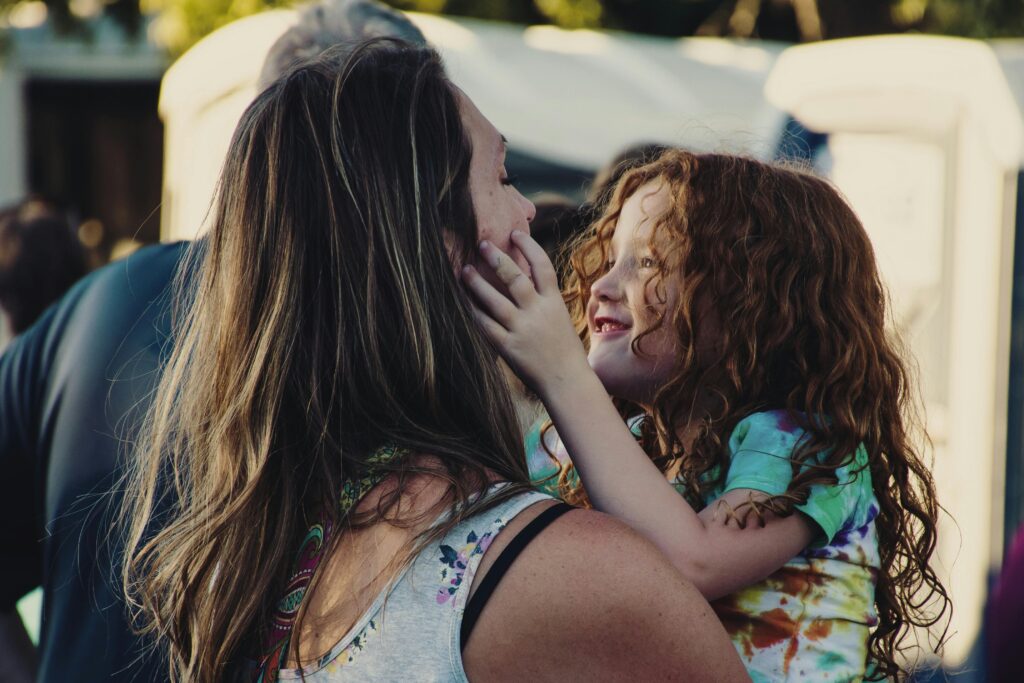OCD and Parenting: When Your Child Becomes a Trigger
December 10, 2024
As a licensed professional counselor working with people who have OCD and anxiety for the past 15 years (and as someone who understands the joys and challenges of parenting myself) I know firsthand how deeply OCD can impact family life. For parents with OCD, daily interactions with children can become unexpected sources of anxiety and intrusive thoughts, creating a whole new set of struggles that most people can’t fully understand.
Today, let’s dive into how OCD and parenting can intersect, the types of triggers parents often face, and some actionable strategies for managing OCD while raising kids. If this resonates with you, remember, you’re not alone, and there are real strategies that can help!
HOW OCD CAN BE TRIGGERED BY PARENTING
Parenting is one of the most meaningful roles in life, but it’s also one of the most demanding. For parents dealing with OCD, the responsibilities and worries of raising a child can be overwhelming. This is because OCD tends to intensify in situations where there’s a high level of responsibility and the stakes feel especially important. And for most parents, what’s more important than the well-being of their children?
For example, with OCD, it’s super common to wrestle with intrusive thoughts, fears, or doubts about causing harm or not doing enough to protect the people you love. Throw parenting into the mix, and those fears can skyrocket—because let’s face it, being a parent cranks up that sense of responsibility to the max.
Because of that, children can sometimes unintentionally act as “triggers” for OCD, sparking anxiety and even compulsive behaviors (like excessive checking, cleaning, or even seeking reassurance). If this is hitting home for you, just know you’re not alone—many parents feel this way!.

COMMON TRIGGERS FOR PARENTS WITH OCD
Understanding the common OCD and parenting triggers can be a powerful first step. Once you know what tends to set off your anxiety, it’s easier to develop strategies to manage it. Here are a few of the most common OCD and parenting-related triggers I see among my clients:
Health and Safety
Many parents with OCD experience heightened concerns about their child’s health and safety. These might include worries about cleanliness, fears of contamination, or anxieties around accidents.
For example, you might find yourself constantly sanitizing your child’s environment or obsessively checking that they’re safe. This can feel relentless and exhausting, leading you to feel trapped in repetitive cycles.
If you’re ready to take control of this pattern, consider exploring The OCD and Anxiety Recovery Blueprint. It’s a no-nonsense, 3-part course designed for those who want to regain control over their relentless thoughts and start living more freely. Check it out here.
Responsibility
Feeling responsible for your child’s well-being? Totally normal for any parent. But with OCD, this can go into overdrive. It can feel like every single detail of your child’s safety and happiness rests entirely on you, and that weight can feel absolutely crushing. This might lead to compulsive habits like triple-checking if the doors are locked, obsessively checking if their environment is “just right,” or constantly seeking reassurance from others. You might even find yourself hyper-alert, always scanning for potential dangers like a one-person security team. Exhausting, right?
This type of hyper-responsibility is a classic example of how OCD and parenting can overlap and steal time and energy that might otherwise be spent enjoying your child.
For parents feeling this weight, my Break Free Action Cards offer daily affirmations designed to help you shift your mindset around anxiety. You can order yours here!
Intrusive Thoughts
Lastly, intrusive thoughts are unwanted, distressing thoughts that can feel alarming, especially when they involve loved ones. It’s not uncommon for parents with OCD to have intrusive thoughts about accidentally harming their child or failing to protect them, (even if these fears are entirely unfounded). These thoughts are not a reflection of your true intentions but rather a hallmark of OCD. Yet, they can feel so real and frightening that parents may avoid certain activities, overcompensate with rituals, or isolate themselves to “protect” their child.
If you’re feeling stuck in this cycle, know that these thoughts do not define you. Many parents struggle with intrusive thoughts, and there is hope.
For a comprehensive data-backed approach to breaking free from these exhausting patterns, consider The OCD and Anxiety Recovery Blueprint to learn tools and strategies that work. Find out more here.
STRATEGIES FOR MANAGING OCD WHILE PARENTING
Parenting with OCD can feel overwhelming, but the good news is that there are strategies to help you take back control and create more calm in your day-to-day. Here are some powerful tools to help you navigate the challenges and find more peace along the way:
1. Exposure and Response Prevention (ERP)
Exposure and Response Prevention (ERP) is one of the most effective treatments for OCD. In ERP, you gradually face your fears (the things that trigger your anxiety) without engaging in compulsive behaviors. Over time, you begin to feel less anxious in situations that once triggered you.
For example, if you struggle with fears around your child’s health, ERP might look like small steps like reducing the frequency of sanitizing. Slowly but surely, ERP helps to reduce the power of your OCD triggers and allows you to approach parenting with less anxiety and more freedom.
2. Self-Compassion
When you’re managing OCD as a parent, I believe that self-compassion isn’t talked about enough. OCD can make you feel guilty, frustrated, or even ashamed for struggling with intrusive thoughts or compulsive behaviors around your child. But remember, you’re doing the best you can with a real, challenging condition.
Practicing self-compassion can help reduce the negative self-talk that often comes with OCD and give you a little more kindness and grace (which every parent needs!).
3. Building Support Systems
Lastly, don’t underestimate the power of a support system. Whether it’s friends, family, support groups, or even a therapist who understands OCD, having people to lean on can make a world of difference. Talking about your experiences, learning from others, and feeling seen and understood can make OCD feel less isolating.
I know it can be hard to open up about OCD-related struggles, but support can be one of the most powerful tools in your toolkit!

OCD AND PARENTING SUPPORT
Managing OCD and parenting can be challenging, but you don’t have to face it alone. There is a light at the end of the tunnel (and speaking from experience—it’s really great over here). Remember, there are real, effective ways to manage your anxiety and regain control. You are stronger than you know, and with the right tools and support, you can create a healthier, more balanced life for you and your child.
If you’re looking for more real talk and practical advice, I invite you to tune into my podcast, All the Hard Things, where I discuss parenting, OCD, and anxiety management strategies. And for additional support and resources, including The OCD and Anxiety Recovery Blueprint, head over to my site here.
You’re not alone in this journey, and with the right approach, you can thrive as a parent—OCD and all!
most popular episodes
Love my podcast?
Episode 112: Postpartum OCD and False Memory OCD
Imagine how in depth I can go in an online course. Instantly downloadable and game-changing. Take the next step towards an amazing life.